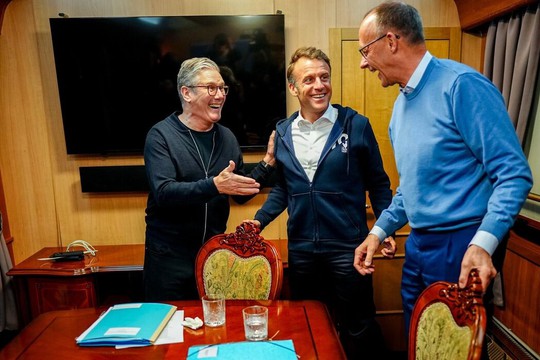Starmer, Macron and Merz – a cheerful company of European bosses
Photo: Getty Images
Under the new German chancellor, personal relations between the leaders of France and Germany are warmer, but a series of intractable divisions from defense to trade remain, POLITICO notes.
After all, on Merz’s first full day in office in May, French President Emmanuel Macron traveled to Paris and vowed “a new Franco-German start for Europe” after years of strained relations between Macron and Merz’s predecessor, Olaf Scholz. Merz said at the time that he had already developed a “deep personal bond” with the French leader that would help them work together.
“The atmosphere is completely different,” said one senior German government official with intimate knowledge of Franco-German relations. “I’ve never experienced this kind of interaction in all these years.”
Paris thinks the same. “The Franco-German reflex has been rediscovered,” an Elysée official said.
But despite the good vibes and increased cooperation on policy areas involving deregulation and migration, the leaders are finding it increasingly difficult to conceal an uncomfortable reality: The promised restart of the Franco-German engine that long powered the European Union is already sputtering, as Merz and Macron confront a series of intractable divisions on everything from defense to trade.
One of the key differences between the current German chancellor and his predecessor is that Scholz recognized how difficult it would be to resolve the key Franco-German differences, and didn’t want to exert enormous energy to achieve the nearly impossible, one conservative lawmaker focusing on foreign relations told POLITICO.
New agreement, deeper divisions
Merz and Macron have a lot in common when it comes to their pro-business leanings and desire to see less regulation. Perhaps the greatest example of this was last month’s cooperation between the two leaders to defang a due diligence law meant to bring EU-style protections to global supply chains.
Another area of increasing agreement is on nuclear energy. In May, Merz’s economy minister, Katherina Reiche, signaled that Berlin was prepared to give up its long-standing opposition to classifying nuclear power as a renewable energy source, potentially ending an enduring clash that has complicated EU energy policy. (Merz’s junior coalition partners, the Social Democrats, oppose the move however.)
The two leaders are also increasingly aligned on drastically reducing the number of asylum seekers coming to Europe. Another potential area of cooperation may involve France’s nuclear deterrent and a potential agreement on how the French could use it to contribute to Europe’s wider security. “This is not a debate that takes place in the media spotlight,” the Elysée official said.
But the core disagreements concerning trade and defense have seen little in the way of rapprochement. “There are two major issues that Germany and France need to resolve in order for us to really make progress,” said Roland Theis, a conservative German lawmaker specializing in Berlin’s relationship with Paris.
Defense and trade
The divisions on defense were laid bare earlier this month when U.S. President Donald Trump backed a German initiative to have Europeans supply Ukraine with American-made weapons. While Nordic countries and the U.K. supported the plan, France opposed it in keeping with Macron’s longstanding push to have Europe produce more weapons locally and reduce dependence on the U.S.
Disagreements between France and Germany also threaten to derail a European project to develop a next-generation fighter jet that would make the bloc less likely to rely on American F-35s. The Elysée official downplayed disagreements over the fighter jet program, saying Merz and Macron “want to move forward.”
But some of the deepest divisions continue to revolve around trade. Merz is pushing the EU to come up with a quick and simple trade agreement with the U.S. in order to put an end to the Trump tariff wars that are hitting German industries particularly hard. The French, meanwhile, are pushing for a tougher approach and better terms.
As Merz pushes for free trade agreements with other parts of the world, the Germans are also encountering French resistance on an EU deal with South America’s Mercosur trade bloc, with Macron anxious to protect his small but politically powerful farming community from new meat imports.
The only way to bridge these differences is for the Germans to move closer to the French on defense, and for France to move closer to Germany on trade, says German lawmaker Theis.
At the same time, he added, “the French need to move on the issue of free trade. Just as we must become more independent from the U.S. in terms of defense, [Europe] must also become more independent from the U.S. in terms of trade relations.”
Window of opportunity closing
“The chancellor and the president are in a dilemma,” said Jacob Ross, a researcher focused on Franco-German relations at the German Council on Foreign Relations. “They have to sacrifice things in terms of domestic policy to make progress in terms of foreign policy.”
But the moment for compromise may soon be lost as both leaders face similar domestic political pressures — in particular the growing influence of far-right parties.
The far-right Alternative for Germany (AfD), now the biggest opposition force in the country’s parliament, portrays Merz as preferring to spend time abroad rather than solving problems at home. In France, the far-right National Rally is polling far ahead of all other parties at 36 percent.
But the biggest obstacle to compromise may be the next presidential election in France, which is set for April 2027. Macron can’t run again because of constitutional term limits, and the country’s domestic politics are looking increasingly unstable.
read more in our Telegram-channel https://t.me/The_International_Affairs

 12:19 24.07.2025 •
12:19 24.07.2025 •























